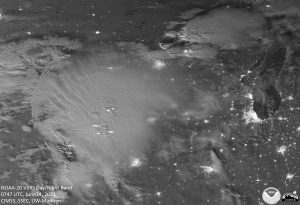Many locations across the country (and the world) have been experiencing unusually heavy rainfalls this summer.

Though in Madison we have had a relatively benign month of August in terms of temperature and humidity, we have still managed to find ourselves 2.09 inches above normal for rainfall for the month prior to Sunday’s rain.
That monthly surplus is almost entirely accounted for by the extremely heavy rainfall on Wednesday night/Thursday morning when 1.86 inches of rain fell at the Dane County Regional Airport — our largest daily total since July 5 and second largest of the summer.
Rain is the liquid form of water, the only substance that occurs naturally in all three phases — solid, liquid and invisible gas — in the Earth’s atmosphere. The 1.86 inches of rain Wednesday/Thursday began as an equivalent amount of water in the invisible vapor (gas) phase before transformed into liquid.
It may come as no surprise that energy (600 calories) is required to transform 1 gram of liquid water into 1 gram of water vapor, the familiar process of evaporation. An exactly similar amount of energy is released into the environment when 1 gram of invisible water vapor condenses into a puddle of liquid water.
The particular amounts of energy needed to accomplish these changes of phase are known as latent heats — the latent heat of evaporation for the first one and the latent heat of condensation for the second. Since we know the depth of accumulated liquid precipitation involved in our recent heavy rain event, the area of Dane County, and the latent heat of condensation, we can calculate how much energy was released to the atmosphere in the production of that much rain.
Without providing the details of the calculation, we can report that the amount of energy involved in just that one rain event could power the entire Madison metro area for approximately 3.9 years. Clearly, there are huge amounts of energy involved.
Steve Ackerman and Jonathan Martin, professors in the UW-Madison department of atmospheric and oceanic sciences, are guests on WHA radio (970 AM) at 11:45 a.m. the last Monday of each month. Send them your questions at stevea@ssec.wisc.edu or jemarti1@wisc.edu.

